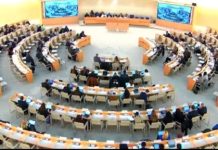By Saikou Suwareh Jabai
The UNICEF Country Representative, Mrs. Sara Beysolow Nyanti, has said every year, globally, millions of girls and women are  subjected to FGM/C, which not only violates their basic human rights, but also denies them their integrity and their right to freedom from violence and discrimination.
subjected to FGM/C, which not only violates their basic human rights, but also denies them their integrity and their right to freedom from violence and discrimination.
She was speaking at the sensitization workshop the Ministry of Justice organized for Immigration officials on FGM/C 12th October 2016, at Kairaba Beach Hotel.
She said the victims and survivors of FGM/C will suffer disproportionately from pain through systematic cutting, health complications, social and economic vulnerability and lack of access to basic services.
She said the event signals a significant evolution in their collective quest to ensure the fulfillment of the rights of children in The Gambia.
She added that the response to FGM/C is not for one sector alone as it requires the active involvement of justice including the judiciary, health, education, internal affairs and all relevant sectors down to the local government structures. She noted that if this practice will be abandoned, it will require everybody to play their role.
In many countries, she added, despite the existence of legal mechanisms to oversee FGM/C, challenges and limitations in implementation persist, and are primarily due to a lack of resources, skilled personnel, appropriate documentation, as well as weak organizational capacity.
“In The Gambia, 75 per cent of girls and women aged 15 to 49 years have undergone FGM/C. For some regions and ethnic groups, the prevalence rate is even higher with more than 90 per cent of women affected. Seeing this grave situation, the government banned the practice in November 2015. This is a great milestone but the work has just begun. Where will families who continue to practice FGM/C run to for support? They might go underground to cutters who still illegally practice. But they might also go out of the country as well. It is very well known that when efforts are made in one country to ban such practices, cross border initiatives to neighboring countries increase,” she was quoted as saying.
The UNICEF Country Representative said this is where the Ministry of Justice has taken a bold step to put systems in place to prevent such attempts.
She said the international community recognises that addressing FGM/C is about addressing structural gender inequalities and harmful social norms, and that requires significant resources and long-term commitment by all stakeholders and not just governments.
Mrs. Sara Beysolow Nyanti, recalled that over the years, UNICEF’s support to ending FGM/C has included research and high level advocacy with government partners, National Assembly Members, and Islamic religious leaders.
She said as it relates to the work around eliminating the practice of FGM/C, UNICEF and UNFPA will continue to support the Government, civil society organisations, and other development partners working towards the promotion and protection of children and women.
“UNICEF also remains fully committed and ready to work together with all our partners towards addressing challenges in Child Protection that affect the children and women of this country. Let us resolve and commit to work towards the abandonment of FGM/C in The Gambia in one generation, she concluded.


















